Abstract
Studies were undertaken in Indian rhesus monkeys (Macaca mulatta) to determine the safety, potency, immunogenicity, and mosquito infectivity of a small-plaque, temperature-sensitive variant of dengue type 2 (DEN-2) virus, a vaccine candidate. Fifteen monkeys were inoculated subcutaneously with the vaccine virus, ten receiving 103.1 plaque-forming units (PFU) and five receiving 104.5 PFU. After primary immunization, viremia was detected in only one monkey, a recipient of the higher dose of vaccine. The recovered virus had the same growth characteristics as the vaccine strain. Aedes aegypti mosquitoes did not become infected when they were allowed to feed on monkeys that received the lower dose of vaccine. As expected, the immunization produced no evidence of illness in any of the animals. A dose response to vaccine was detected; all five of the high-dose recipients developed neutralizing antibodies, whereas only five of ten low-dose recipients did so. In both groups, neutralizing antibody was often transient. Its presence at 30 days did not always correlate with protection from viremia in those animals challenged 4 to 6 months after vaccination with wild-type DEN-2 virus. However, immunized animals developed anamnestic antibody responses after challenge, and none demonstrated adverse effects to infection. Reimmunization of monkeys 4 months after primary immunization led to the production of low-titered but persistent neutralizing antibody which protected the animals from a wild-type virus challenge.
Full text
PDF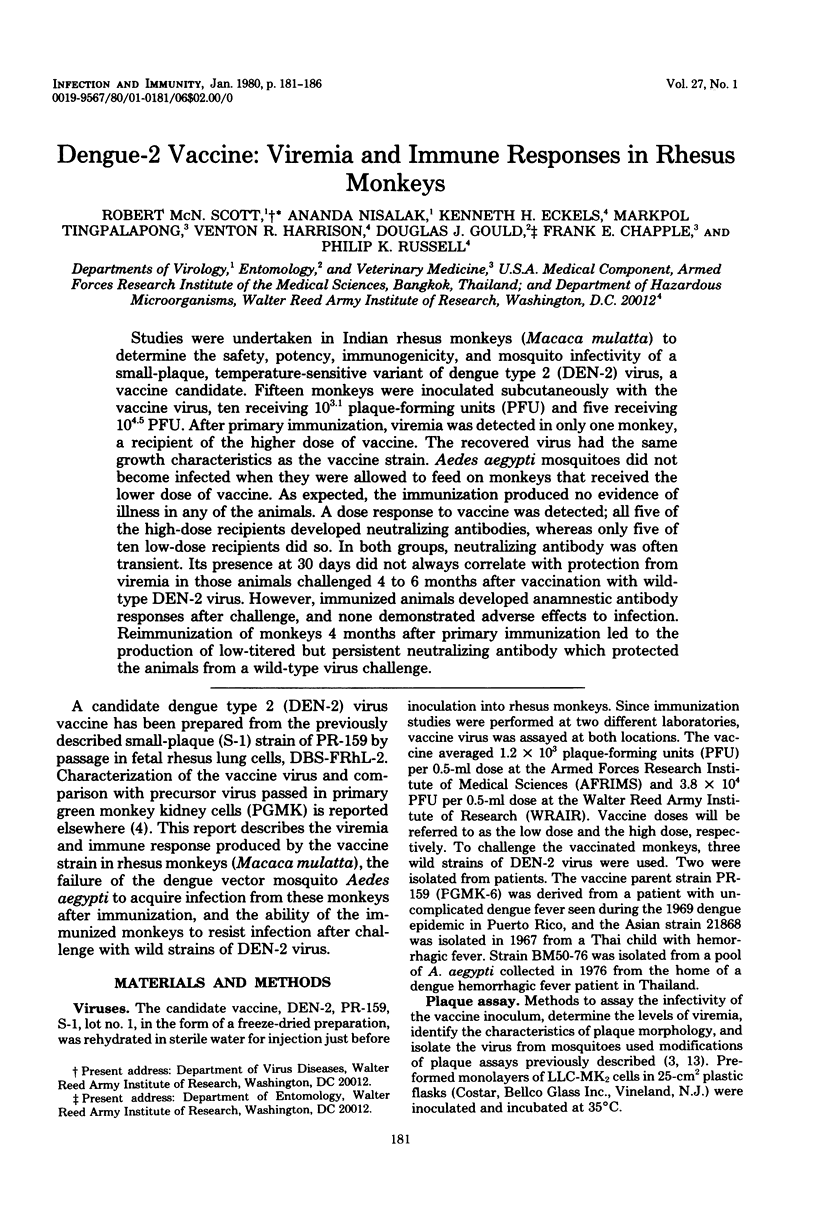
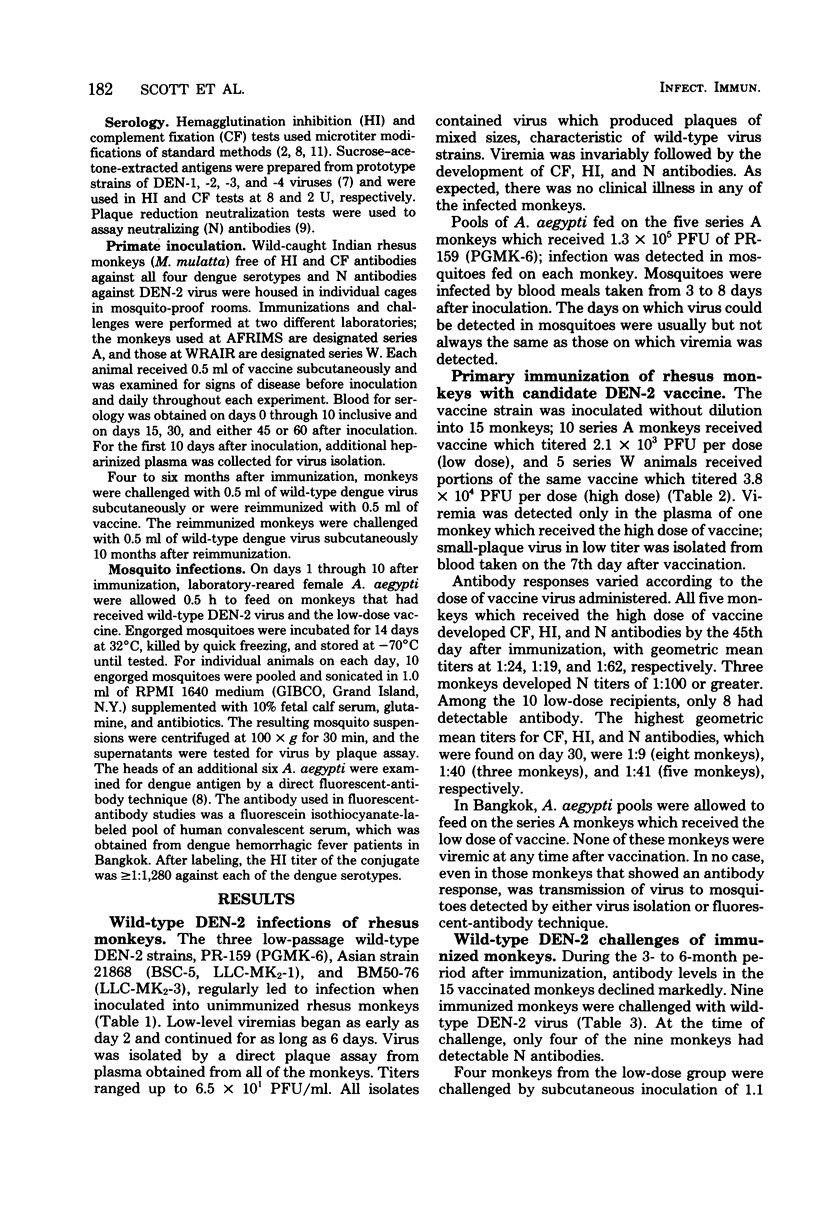
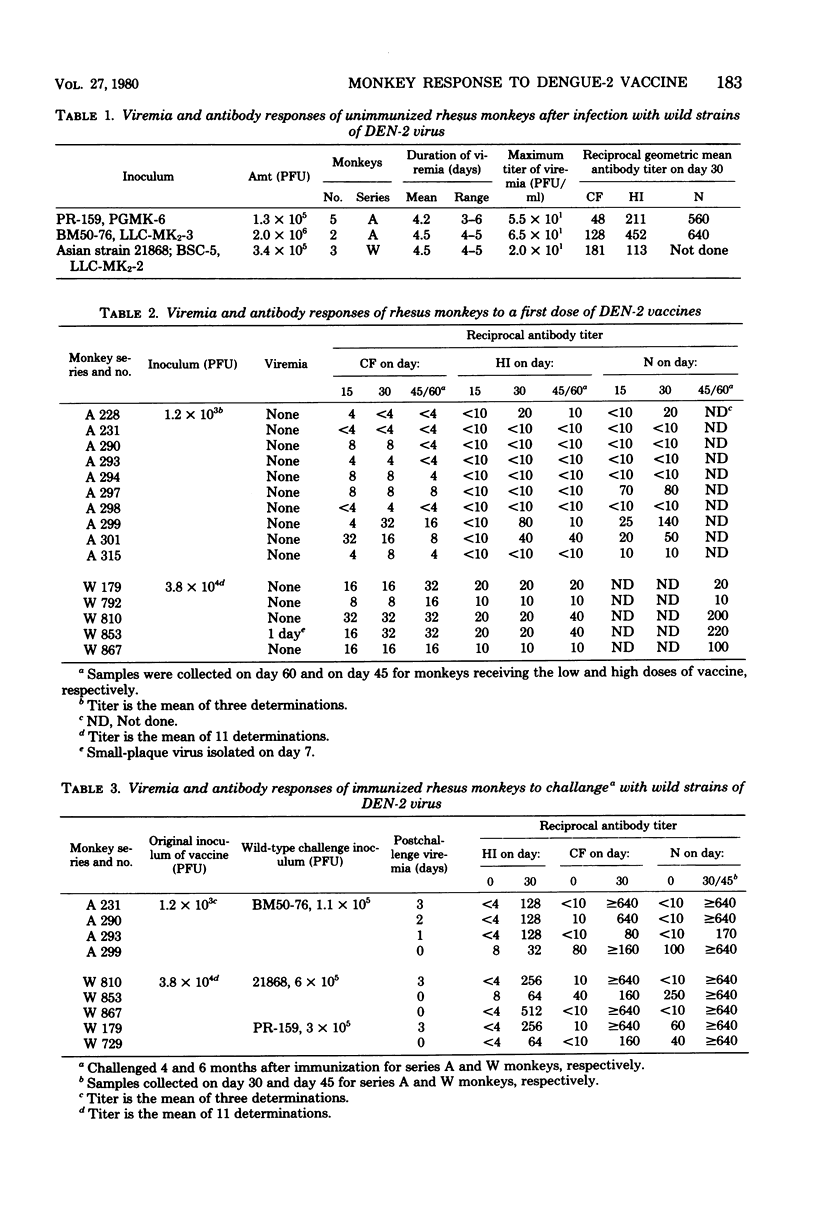
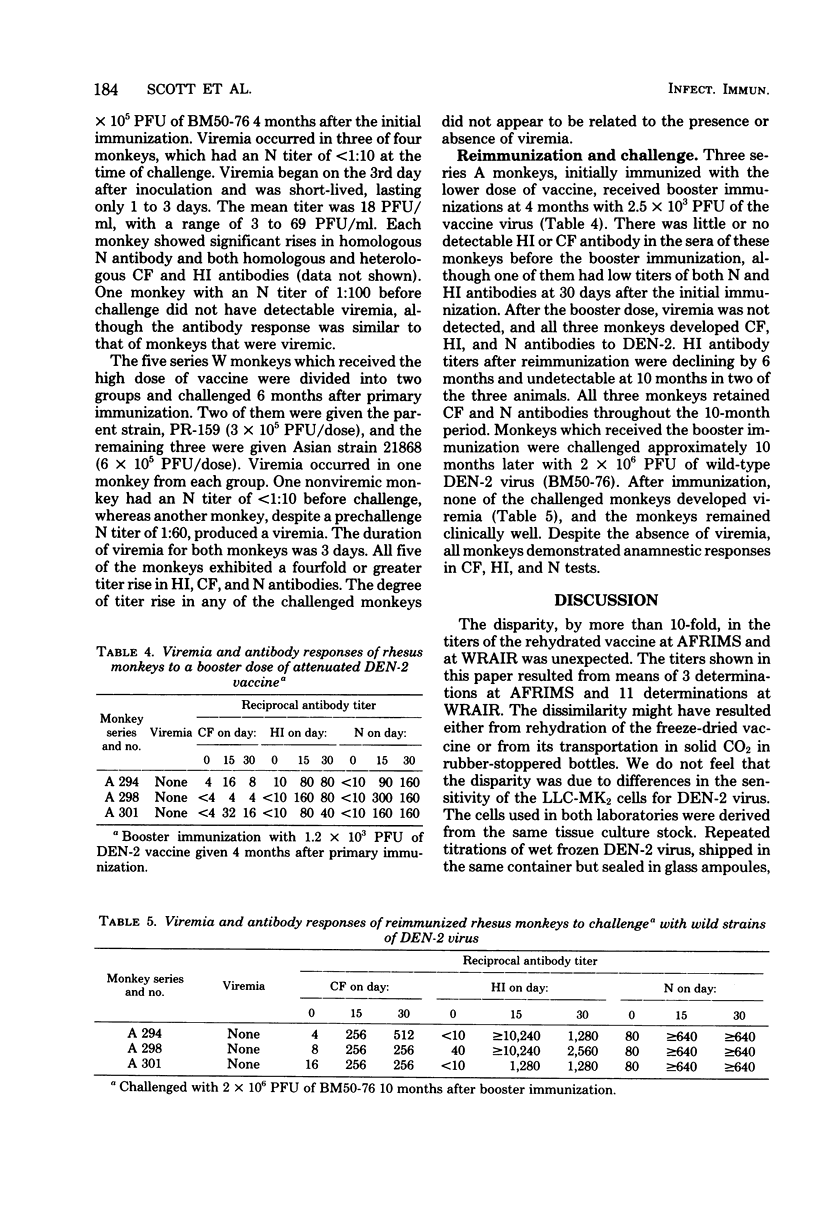
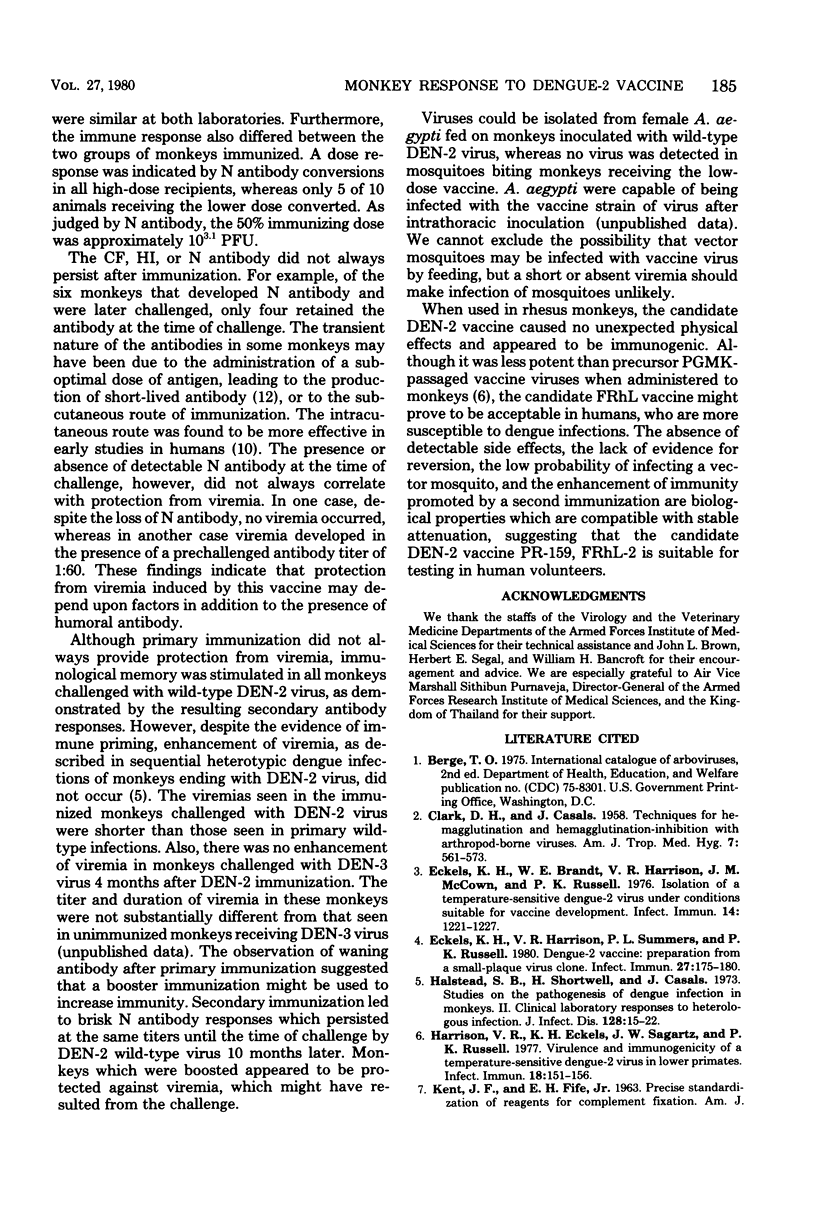
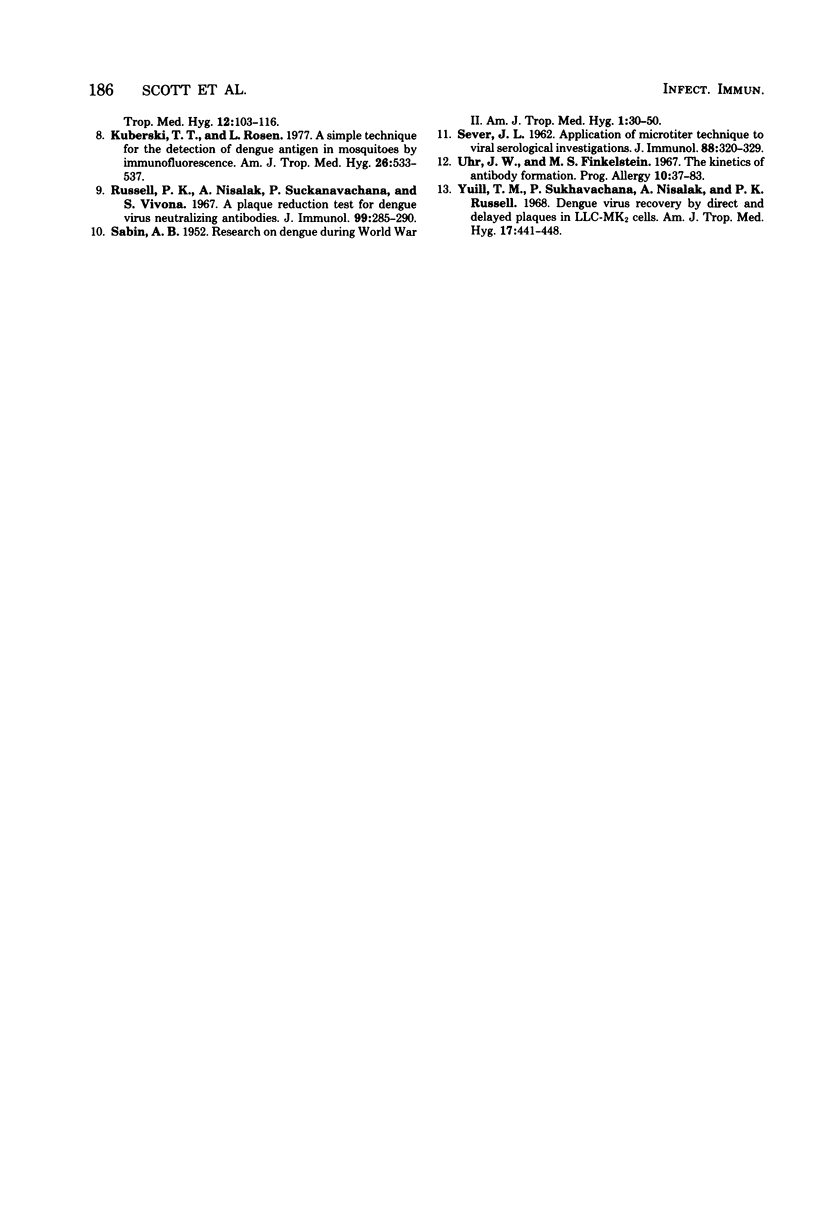
Selected References
These references are in PubMed. This may not be the complete list of references from this article.
- CLARKE D. H., CASALS J. Techniques for hemagglutination and hemagglutination-inhibition with arthropod-borne viruses. Am J Trop Med Hyg. 1958 Sep;7(5):561–573. doi: 10.4269/ajtmh.1958.7.561. [DOI] [PubMed] [Google Scholar]
- Eckels K. H., Brandt W. E., Harrison V. R., McCown J. M., Russell P. K. Isolation of a temperature-sensitive dengue-2 virus under conditions suitable for vaccine development. Infect Immun. 1976 Nov;14(5):1221–1227. doi: 10.1128/iai.14.5.1221-1227.1976. [DOI] [PMC free article] [PubMed] [Google Scholar]
- Eckels K. H., Harrison V. R., Summers P. L., Russell P. K. Dengue-2 vaccine: preparation from a small-plaque virus clone. Infect Immun. 1980 Jan;27(1):175–180. doi: 10.1128/iai.27.1.175-180.1980. [DOI] [PMC free article] [PubMed] [Google Scholar]
- Halstead S. B., Shotwell H., Casals J. Studies on the pathogenesis of dengue infection in monkeys. II. Clinical laboratory responses to heterologous infection. J Infect Dis. 1973 Jul;128(1):15–22. doi: 10.1093/infdis/128.1.15. [DOI] [PubMed] [Google Scholar]
- Harrison V. R., Eckels K. H., Sagartz J. W., Russell P. K. Virulence and immunogenicity of a temperature-sensitive dengue-2 virus in lower primates. Infect Immun. 1977 Oct;18(1):151–156. doi: 10.1128/iai.18.1.151-156.1977. [DOI] [PMC free article] [PubMed] [Google Scholar]
- Kuberski T. T., Rosen L. A simple technique for the detection of dengue antigen in mosquitoes by immunofluorescence. Am J Trop Med Hyg. 1977 May;26(3):533–537. doi: 10.4269/ajtmh.1977.26.533. [DOI] [PubMed] [Google Scholar]
- Russell P. K., Nisalak A., Sukhavachana P., Vivona S. A plaque reduction test for dengue virus neutralizing antibodies. J Immunol. 1967 Aug;99(2):285–290. [PubMed] [Google Scholar]
- SABIN A. B. Research on dengue during World War II. Am J Trop Med Hyg. 1952 Jan;1(1):30–50. doi: 10.4269/ajtmh.1952.1.30. [DOI] [PubMed] [Google Scholar]
- SEVER J. L. Application of a microtechnique to viral serological investigations. J Immunol. 1962 Mar;88:320–329. [PubMed] [Google Scholar]
- Uhr J. W., Finkelstein M. S. The kinetics of antibody formation. Prog Allergy. 1967;10:37–83. [PubMed] [Google Scholar]
- Yuill T. M., Sukhavachana P., Nisalak A., Russell P. K. Dengue-virus recovery by direct and delayed plaques in LLC-MK2 cells. Am J Trop Med Hyg. 1968 May;17(3):441–448. doi: 10.4269/ajtmh.1968.17.441. [DOI] [PubMed] [Google Scholar]


